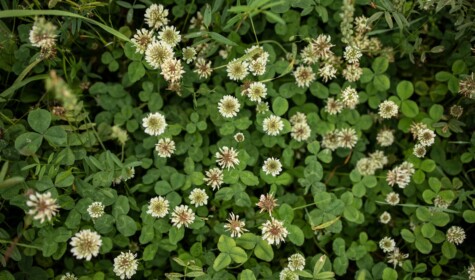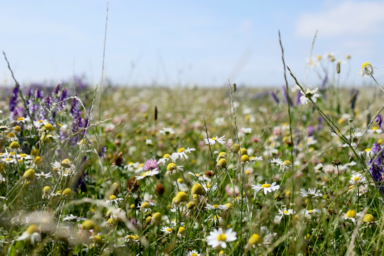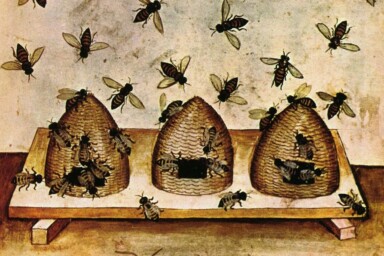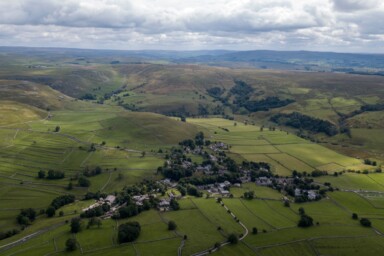The roots of Britain’s current intensive crop and livestock systems can be traced back to World War II when the inaccessibility of imports necessitated urgent increases in production on home soil. The industrialised farming practices that emerged from this period continue to dominate the landscape to this day, encouraged by agricultural policy and the global trend for producing, consuming and wasting ever more food. The unceasing quest for greater yields has had a devastating impact on our nature. Britain is now considered one of the most wildlife-depleted countries in the world and calls for urgent reform of our food and farming systems grow louder by the day.
Ideas as to how to transform UK agriculture so that it heals and protects the environment rather than continuing to degrade it, can be largely divided between two primary approaches, commonly known as ‘land sparing’ and ‘land sharing’. First thought to have been used by Cambridge scientists in 2005, the terms represent two distinct visions for farming that feeds the planet, without damaging biodiversity.
Land sparing calls for a reduction in the amount of land used for farming and an increase in areas dedicated to nature. Within this approach, technology is used to further intensify production on land that remains in agricultural use, ideally while also reducing chemical inputs – this is often termed ‘sustainable intensification’. This approach aims to free up more land for conservation, supporting populations of insects and animals that struggle to survive in farmed and urban landscapes to recover and hopefully thrive.
Land sharing, meanwhile, is the principle of farming in harmony with nature to deliver biodiversity and food production on the same land. This is achieved by de-intensifying our farming systems and using nature-based practices to produce food with fewer inputs, less waste and more diversity. In this ‘agroecological’ approach the farm represents an important ecosystem that benefits plants, animals and people. Associated farming methods include agroforestry, regenerative crop rotations, mixed farming systems and companion cropping.
Although both approaches aim to protect nature and tackle climate change while feeding a growing population, the advantages and disadvantages of each have long been subject to heated debate. Proponents of land sparing believe that the majority of farming systems are ultimately incompatible with efforts to protect wildlife. They also argue that the lower yields associated with agroecological farming systems mean that land sharing couldn’t feed the planet without occupying ever more land.
These opinions are disputed by proponents of land sharing, who view farming as a key part of the solution in tackling climate change and biodiversity loss, and capable of being practiced in harmony with nature. Their concerns around land sparing include the finite productivity of intensively farmed soils, the potential for continued use of harmful chemical inputs, the welfare issues associated with intensive livestock systems and the risks to nature of creating isolated conservation areas bordered by inhospitable farmland. They also fear that land sparing could impact the estimated 600 million smallholders worldwide, many of whom use low-intensity methods and may be unable to access the technology necessary to farm more intensively.
Conscious of the often-cited criticism that land sharing couldn’t produce sufficient food without occupying more land, the Sustainable Food Trust’s 2022 report ‘Feeding Britain from the Ground Up’ modelled a nationwide transition to agroecological farming systems and investigated the impacts on land use and food production. The report found that with changes in how we eat and significant reductions in food waste, this approach could produce enough food to maintain current levels of self-sufficiency in Britain, while freeing up an additional 1.5 million acres for nature and other ecosystem services – reducing the total land occupied by agriculture from 72% to 62% of the UK’s total area.
Tackling food waste could significantly improve the viability of agroecological systems by reducing the amount of calories and nutrients lost from the food system. Globally, we already, technically, produce more than enough food for everyone, however, one third of this is lost or wasted. WRAP statistics suggest that in the UK, 7% of all harvested food is wasted before it leaves the farm and a further 22% is wasted beyond the farmgate. These losses from the system are further compounded by an estimated 40% of the UK’s arable land area being used to produce food for livestock – a highly inefficient use of cropland in terms of calories produced for human consumption. The ‘Feeding Britain’ report, therefore, modelled a huge fall in the amount of grain fed to livestock and a 50% reduction in food waste (in line with the Courtauld Commitment 2030) to help match the levels of food produced by our current farming systems.
In the report’s vision for a regeneratively farmed UK, siloed and specialised food production, including arable monocultures and intensive pork and poultry, would be replaced by mixed rotational systems. High welfare, pasture-based livestock would often be integrated with more diverse cropping systems, and the farms would align with the principles of the circular economy by producing much of their own animal feed (in the form of pasture, cereals and food and crop waste) and fertiliser (in the form of manure and compost). Crop rotations (including fertility-building legume phases and species-rich temporary grasslands) would be used to break pest and disease cycles and generate soil fertility, while a diverse mix of chemical-free on-farm habitats would support birds, insects and other wildlife. The reintroduction of hedges, wildflower meadows, beetle banks and woodland onto farmland would all encourage a far more biodiverse agricultural landscape.
The findings of the ‘Feeding Britain’ report, therefore, indicate that the agroecological systems associated with land sharing do have the potential to benefit nature and feed the nation. However, whether you align more closely with the principles of land sparing or land sharing, there is little disagreement that our farming systems require urgent and extensive change. The vast scale of land dedicated to agriculture in Britain means that the sector has a significant impact on climate and nature. However, the good news is that, as the report details, farming has huge potential to shift from being part of the problem to part of the solution, as long as we are willing to leave behind our industrialised systems, eat differently and embrace a new vision for farming that benefits nature, the climate and, of course, humans.







